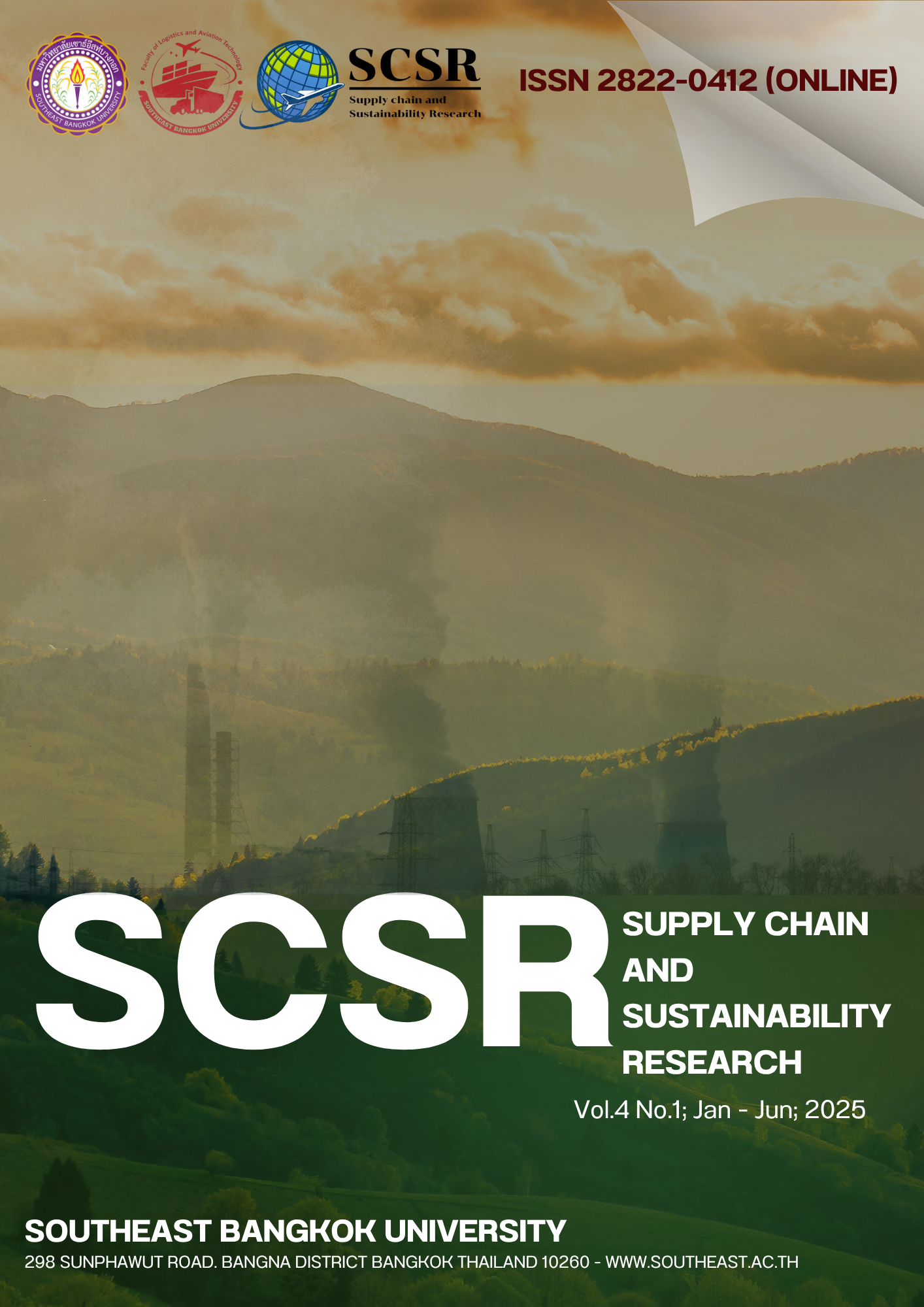Co-Creation for Sustainable Development: A Community-Driven Innovation Model in Bang Nam Phueng, Thailand
Main Article Content
บทคัดย่อ
This study explores a community-driven co-creation model for localizing the Sustainable Development Goals (SDGs) in Bang Nam Phueng, Thailand. Using a participatory action research (PAR) approach, the research engaged 70 international youth participants and local stakeholders across five thematic areas: inclusive tourism, waste management, circular packaging, sustainable mobility, and digital transformation. The study applies the SMCR communication framework to analyze how intercultural collaboration can generate practical, scalable solutions aligned with SDGs 11, 12, and 13. Results demonstrate that youth-led innovation, grounded in local culture and facilitated through stakeholder communication, can effectively enhance sustainability outcomes in community contexts. The research proposes two key outputs: (1) a Co-Learning Framework for youth engagement and (2) a Stakeholder Communication Toolkit adapted from the SMCR model. These models offer a transferable blueprint for participatory SDG implementation through community-based innovation.
Article Details

อนุญาตภายใต้เงื่อนไข Creative Commons Attribution-NonCommercial-NoDerivatives 4.0 International License.
บทความนี้ได้รับการเผยแพร่ภายใต้สัญญาอนุญาต Creative Commons Attribution-NonCommercial-NoDerivatives 4.0 International (CC BY-NC-ND 4.0) ซึ่งอนุญาตให้ผู้อื่นสามารถแชร์บทความได้โดยให้เครดิตผู้เขียนและห้ามนำไปใช้เพื่อการค้าหรือดัดแปลง หากต้องการใช้งานซ้ำในลักษณะอื่น ๆ หรือการเผยแพร่ซ้ำ จำเป็นต้องได้รับอนุญาตจากวารสารเอกสารอ้างอิง
Agnello, M. F., Mancuso, J., & Wight, J. (2024). Culturally responsive co-creation: A transdisciplinary framework. Journal of Social Innovation, 12(1), 33–51. https://doi.org/10.1016/jsi.2024.003
Berlo, D. K. (1960). The process of communication: An introduction to theory and practice. Holt, Rinehart and Winston.
Borojević, T., Jukić, M., & Pranjić, M. (2023). Participatory design for social resilience in multicultural urban spaces. Cities and Society, 40(2), 78–89. https://doi.org/10.1080/ccs.2023.0089
Borojević, T., Petrović, N., Radaković, J., Glomazić, H., Radojičić, M., Milenković, N., Maletič, D., & Maletič, M. (2023). Youth participation for sustainable value creation: The role and prioritization of SDGs. Sustainability. https://doi.org/10.3390/su152316456
Byram, M. (2008). From foreign language education to education for intercultural citizenship: Essays and reflections. Multilingual Matters.
Deardorff, D. K. (2006). Identification and assessment of intercultural competence as a student outcome of internationalization. Journal of Studies in International Education, 10(3), 241–266. https://doi.org/10.1177/1028315306287002
Fischer, C., & Radinger-Peer, V. (2024). How to integrate youth in regional sustainability transformation processes: Tools, structures, and effects. Ambio, 53, 1574–1586. https://doi.org/10.1007/s13280-024-02048-x
Jennings, L. B., Parra-Medina, D. M., Hilfinger Messias, D. K., & McLoughlin, K. (2006). Toward a critical social theory of youth empowerment. Journal of Community Practice, 14(1–2), 31–55. https://doi.org/10.1300/J125v14n01_03
Kim, Y. Y. (2001). Becoming intercultural: An integrative theory of communication and cross-cultural adaptation. Sage Publications.
Kruger, C., Caiado, R. G. G., França, S. L. B., & Quelhas, O. L. G. (2018). A holistic model integrating value co-creation methodologies towards the sustainable development. Journal of Cleaner Production, 191, 400–416. https://doi.org/10.1016/j.jclepro.2018.04.180
Mezirow, J. (2000). Learning as transformation: Critical perspectives on a theory in progress. Jossey-Bass.
Sierra-Pérez, J., & López-Forniés, I. (2019). Co-creative experiences for the achievement of the Sustainable Development Goals. In S. López (Ed.), Advances in Human Factors and Systems Interaction (pp. 49–57). Springer. https://doi.org/10.1007/978-3-030-41200-5_6
Smith, D. (2020). Youth in transcultural learning environments: Developing global competence through local action. Global Education Review, 7(2), 13–29.
Szetey, K., Moallemi, E. A., Ashton, E., Butcher, M., Sprunt, B., & Bryan, B. A. (2021). Participatory planning for local sustainability guided by the Sustainable Development Goals. Ecology and Society, 26(3), Article 16. https://doi.org/10.5751/ES-12566-260316
Trenchs-Parera, M., & Pastena, A. (2021). Identity negotiation and global citizenship in intercultural study abroad. Language and Intercultural Communication, 21(5), 561–578. https://doi.org/10.1080/14708477.2021.1920164
Voorberg, W. H., Bekkers, V. J., & Tummers, L. G. (2015). A systematic review of co-creation and co-production: Embarking on the social innovation journey. Public Management Review, 17(9), 1333–1357. https://doi.org/10.1080/14719037.2014.930505
Zimmerman, M. A. (2000). Empowerment theory: Psychological, organizational and community levels of analysis. In J. Rappaport & E. Seidman (Eds.), Handbook of community psychology (pp. 43–63). Springer. https://doi.org/10.1007/978-1-4615-4193-6_2


